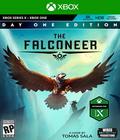Buy The Falconeer
The Falconeer is an open-world air combat game from the mind of Tomas Sala. The game offers plenty of intriguing ideas and refreshing concepts, but it falls short of its ambitions.
The Falconeer sets itself apart from other air combat games by letting the player freely explore the fictional world of Ursee while mounted on a falcon. The Ursee is a vast oceanic world with warring factions/houses. The game consists of four chapters, each focusing on a different faction, and gives you a brief glimpse into the motives and history of each house. Dunkle, a struggling traders' port, is the setting for the introductory hours of the game, where you perform menial tasks while learning the controls. Some quests may require the delivery of a package to a nearby island, while another may ask you to take out a handful of nearby pirate vessels or enemy falconeers. Along the way, you'll receive brief dialogue snippets to push the narrative forward.
The voice acting is cartoonish yet serviceable, but it wasn't engaging enough for a game that so desperately deserves it. Sala has clearly done his best to craft an interesting world with tons of lore. I want to know about the Ursee, its vast ocean, and the warring factions. I want to know more about the Maw — a vast sinkhole that stretches the length of the Ursee ocean — but the delivery of the narrative doesn't do the job. You can piece together bits of world lore from different areas of the game. Some of it may be divulged while you hover over a location in the overworld map, other pieces may be a dialogue cue that triggers when you land the falcon. All of it makes for a disorganized narrative that doesn't hit as well as if it had been more streamlined.
Exploration is perhaps the most distinctive element of The Falconeer, as the Ursee is yours to explore as you see fit. Some of the lore won't be discoverable via the mainline quests. Other islands will be discovered through side-quests or free roaming. At any point, you can take on a side-quest or fly over the ocean for as long as you'd like. With smooth controls and gorgeous animations, flying through the world was by far my favorite part of the game. Your falcon's wings flap gracefully, and its feathers flutter from the wind in a syncopated fashion all while the rolling waves below crash against nearby rocks. In those moments, it's easy to get lost in the soothing, almost melancholy atmosphere.
There is some monotony to those moments, though — particularly in the early hours of the game, when the progression is slow. Your starting falcon has little to no energy, slow speeds, and hardly any health or regenerative capabilities. While these can all be overcome by leveling up your falcons or unlocking new falcons by racing, it takes some time before you unlock a falcon that's capable of those exhilarating flights.
This holds true in the combat as well. The Falconeer offers a prologue chapter that serves as a tutorial, but it doesn't do enough to familiarize the player with the combat mechanics. You'll learn how to fire weapons, lock on to enemies, target sections of larger enemy airships, and drop bombs on fortifications, but it takes a while for any of it to click. It took a long time for me to figure out the range at which my weapons were effective. You can lock on to your target from a distance, and there's a reticle on enemies to lead your shots, but none of these mechanics amount to anything. The combat system desperately craves additional depth, but I didn't experience moments of exhilaration where a distant shot demanded skill or dexterity. Unaware as to why my shots weren't landing, I was ready to give up on the combat until I realized that utilizing the auto-aim system when you're inches away from a nearby enemy was the only way to excel in battles. That seems to be the only "strategy" that works.
Some of these combat pain points get resolved in the later hours of the game. As you dive deeper into The Falconeer, you'll unlock new weapons and ammo types for your falcon. As with many other aspects of the game, this also isn't explained clearly to the player. It's up to you to figure out how and where to go for falcon upgrades. Once you unlock the various upgrades, you can take down enemies more quickly, but you'll never escape the reliance upon the auto-aim. Long-distance skill shots are simply nonviable.
Performance-wise, The Falconeer runs beautifully. Sure, the simplistic visuals don't do much to stress the components of the next-gen hardware of Xbox Series S & X, but that leads to a crisp experience that lends well to the genre. Letting the player choose between either a 60fps or 120fps mode, combat can be fast yet clear, so you can maintain a line of sight on enemy combatants no matter how many barrel rolls, hairpin turns, and dive bombs are required. Even in the slow-paced flights, the high frame rate animations of the falcon and the waves below are captivating in their graceful smoothness. In addition to this, due to the console's high-speed SSDs, the only load screens appear during death, and even those last a mere second or two.
The Falconeer's simplistic but captivating visuals are representative of the game as a whole. There's a simplicity to its gameplay and narrative, but there's something intriguing about the lore. The game doesn't stick the landing on its unique concepts, though. Clocking in at around 10 hours, the four chapters feel like the start of something really special — before the game abruptly ends. The first two chapters offer little in the way of diversity, and just as you come to grips with the game mechanics and start finding some engaging environments in the final hours, it ends. I wanted to learn more about the game world. I wanted to get in more exhilarating battles now that my falcon was competent enough to fly around without draining its energy meter, but the game wraps up just as I started getting into it. With a distinct art style, gorgeous animations, and intriguing lore, there's enough in The Falconeer to justify a playthrough, but most of its enjoyment doesn't shine through until the last couple of hours.
Score: 7.0/10
More articles about The Falconeer











 The Falconeer is an ocean-world fantasy aerial combat RPG that combines classic dog fighting mechanics and acrobatic twists and turns with an awe-inspiring open environment and bestiary of fantastic enemies in land, sea, and air.
The Falconeer is an ocean-world fantasy aerial combat RPG that combines classic dog fighting mechanics and acrobatic twists and turns with an awe-inspiring open environment and bestiary of fantastic enemies in land, sea, and air.





























